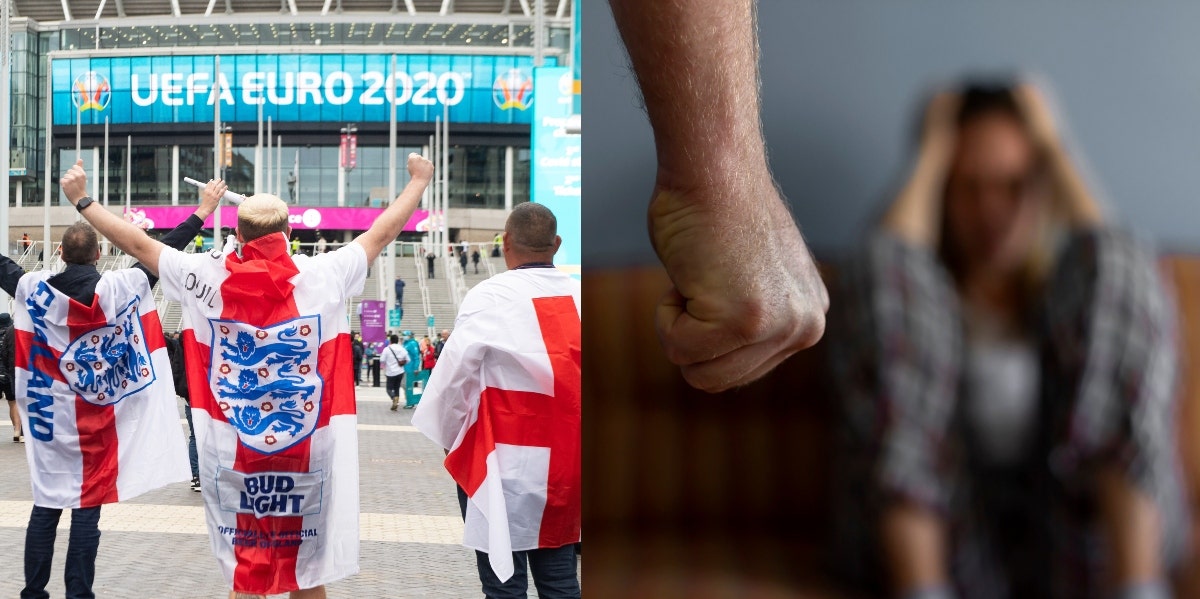Domestic Violence In The U.K. Likely Increased 38% After England's Euros Loss — And America Has A Similar Problem
Often, violence is taken off the pitch.
 Jelena Stanojkovic / Michael Tubi / Shutterstock
Jelena Stanojkovic / Michael Tubi / Shutterstock As soccer fans in England mourn the nation’s Euros 2020 loss, their families and partners may be fearful of the reaction to the defeat off the pitch.
Charities across the United Kingdom warned of a possible spike in domestic violence incidents as Italy claimed victory over the team.
“Some people think football is a matter of life and death — to victims of domestic abuse, it often is,” warned the National Centre for Domestic Violence (NCDV).
Early estimates suggest domestic violence increased by 38% last night after the loss.
Domestic violence spikes during soccer tournaments.
This statistic has long been a concern for organizations addressing domestic abuse.
In 2018, during the World Cup, NCDV released a shocking statistic that shows reports of domestic violence increase by 26% when the English soccer team plays and 38% when the team loses.
A more recent study, released at the beginning of July, goes further into the statistics by examining crimes reports in Manchester between 2012 and 2019. The study correlates these reports to games played by Manchester United and Manchester City.
The study linked earlier kick-off times to increased domestic abuse and tracked how rates of violence decreased for the duration of the matches before steadily increasing later on.
Global sporting events lead to increased domestic abuse.
The shocking statistics are not exclusive to England, nor to soccer. Domestic violence rises during AFL season in Australia.
In Canada, calls to one domestic abuse hotline in Alberta rose by 15% whenever a local team played.
Meanwhile, a 2011 study examining 900 NFL games over 11 years found that domestic violence reports increased by 10% when a local team lost.
Globally, a sporting win or loss can create a night of trauma and fear in the households of these avid fans.
Increased stress, rage and frustration are at play in these incidents but excessive alcohol consumption is likely to be one of the most dangerous risk factors.
Relationship consultant and abuse expert Rhoberta Shaler says the heightened emotions of sports games can exacerbate abusive tendencies.
“People who are abusive at home are arousal-seekers in many ways. People with a high optimum level of arousal tend to display risky behaviors. Therefore, coming home from viewing or participating in a sporting event (or watching one at home) can cause people with narcissistic or anti-social tendencies to feel emboldened to turn that arousal and its consequences to negatively affect their partners, children, pets, or anyone nearby.”
She adds that abusers may exert control in their home if they don’t have control over the outcome of these sporting events.
“They do not differentiate their source of arousal and often transfer it to a situation in which they feel more powerful.”
The British Beer and Pub Association suggested that nearly 13m pints would be sold on Sunday, with 7.1m pints consumed during the match.
This, along with the spike in domestic violence, raises questions about the culture and behaviors sporting events promote.
Sports fans are encouraged be passionate to an extreme degree, hypermasculinity is also often the focus of these sports.
These fans are riled up throughout the games, fed with alcohol and then sent into homes with their vulnerable partners, children or other family members.
With women making up the majority of domestic violence cases, sports becomes an unsafe space for women both on and off the pitch.
If you or someone you know is suffering from domestic abuse or violence, there are resources to get help. There are ways to go about asking for help as safely as possible. For more information, resources, legal advice, and relevant links visit the National Domestic Violence Hotline. For anyone struggling from domestic abuse, call the National Domestic Violence Hotline at 1-800-799-SAFE (7233). If you’re unable to speak safely, text LOVEIS to 1-866-331-9474 or log onto thehotline.org.
Alice Kelly is a writer living in Brooklyn, New York. Catch her covering all things social justice, news, and entertainment. Keep up with her Twitter for more.

